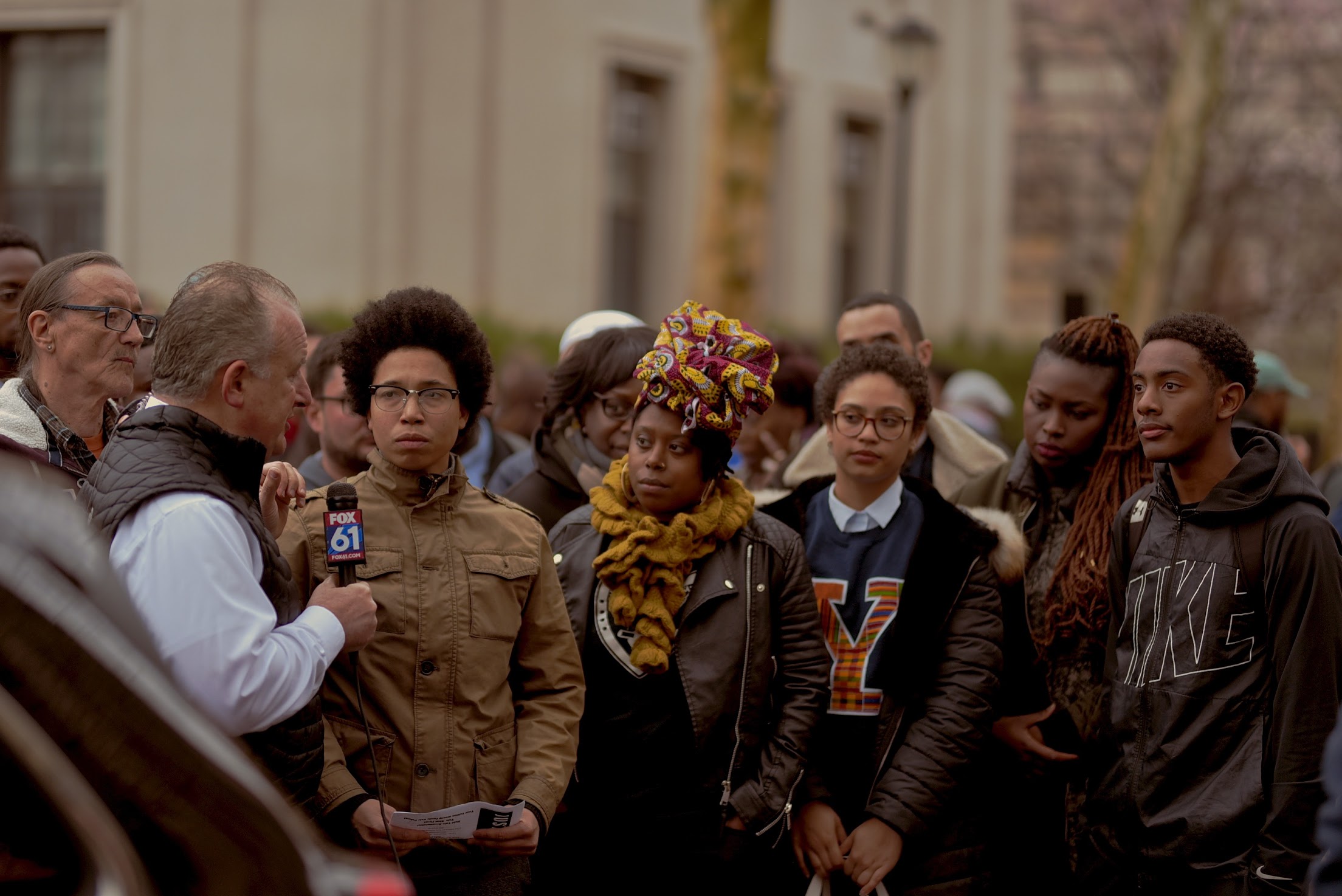As violence surges at home, Ecuadorian organizers in Connecticut mobilize immigrant communities across the U.S. to secure their right to stay.
I.
Colorful floats descended toward the New Haven Green on the morning of August 18th. Ecuadorian and American flags waved from motorcycles, jeeps, pickup trucks, even a Hummer limousine. Dancers in traditional dress swept into the park as vendors sold cevichocho and cotton candy out of the trunks of their cars. Children carried their own miniature flags. Balloons rose, and wild honks filled the air.
As Yale’s newest undergraduates were moving into Old Campus, hundreds of Ecuadorians gathered on the Green across the street to commemorate the 1809 uprising that kicked off Ecuador’s long struggle for independence from colonial rule. Each year, the local Ecuadorian community—approximately the sixth largest among the foreign-born population of New Haven County—celebrates this holiday by holding a parade.
The festivities begin just outside 1 Church Street, where the Consulate of Ecuador in Connecticut shares a building with a Yale School of Public Health research center. (The consulate is one of only three fully accredited foreign missions in the state of Connecticut, and the only one outside of Hartford.)
This year, leading the parade were Angélica Idrovo and Carlos Córdova, among other representatives of local community organizations. They marched shoulder-to-shoulder, in step with the music. They looked determined. Together, they carried a sign that read:
PODER COMUNITARIO
TPS FOR ECUADOR.
The banner was a call to action. Connecticut immigration activists like Angélica and Carlos have been trying to get the United States’ government to designate Ecuador as a country eligible for Temporary Protected Status (TPS) for over a year. The TPS designation—enshrined in federal law as a safeguard for people whose home countries are dangerous to return to—would protect undocumented Ecuadorians from deportation and allow them to legally seek work for a defined period. With an ongoing wave of gang violence and an energy crisis currently facing the South American nation, activists say such a measure is more than justified; sending undocumented Ecuadorians back home under the current conditions can put their lives in danger.
Connecticut has long been an epicenter for Ecuadorian life and activism in the U.S. Possessing the fifth-largest Ecuadorian population in the entire country, the state is home to numerous associations of Ecuadorians that regularly lead advocacy efforts to address their communities’ needs. In 2008, this activism played an important role in helping to establish the Ecuadorian Consulate in New Haven, which now services migrant communities in Maine, Rhode Island, Massachusetts, Vermont, and New Hampshire, in addition to Connecticut.
In August of 2023, escalating violence in Ecuador prompted a group of local Connecticut activists to start lobbying for TPS. The campaign has since spun into a grassroots coalition with advocacy hubs across the U.S., engaging over thirty-five federal legislators and executive officials, as well as senior members of the Ecuadorian government. Their efforts have forged new ways for largely undocumented Ecuadorian populations across the country to exercise political influence at the national level.
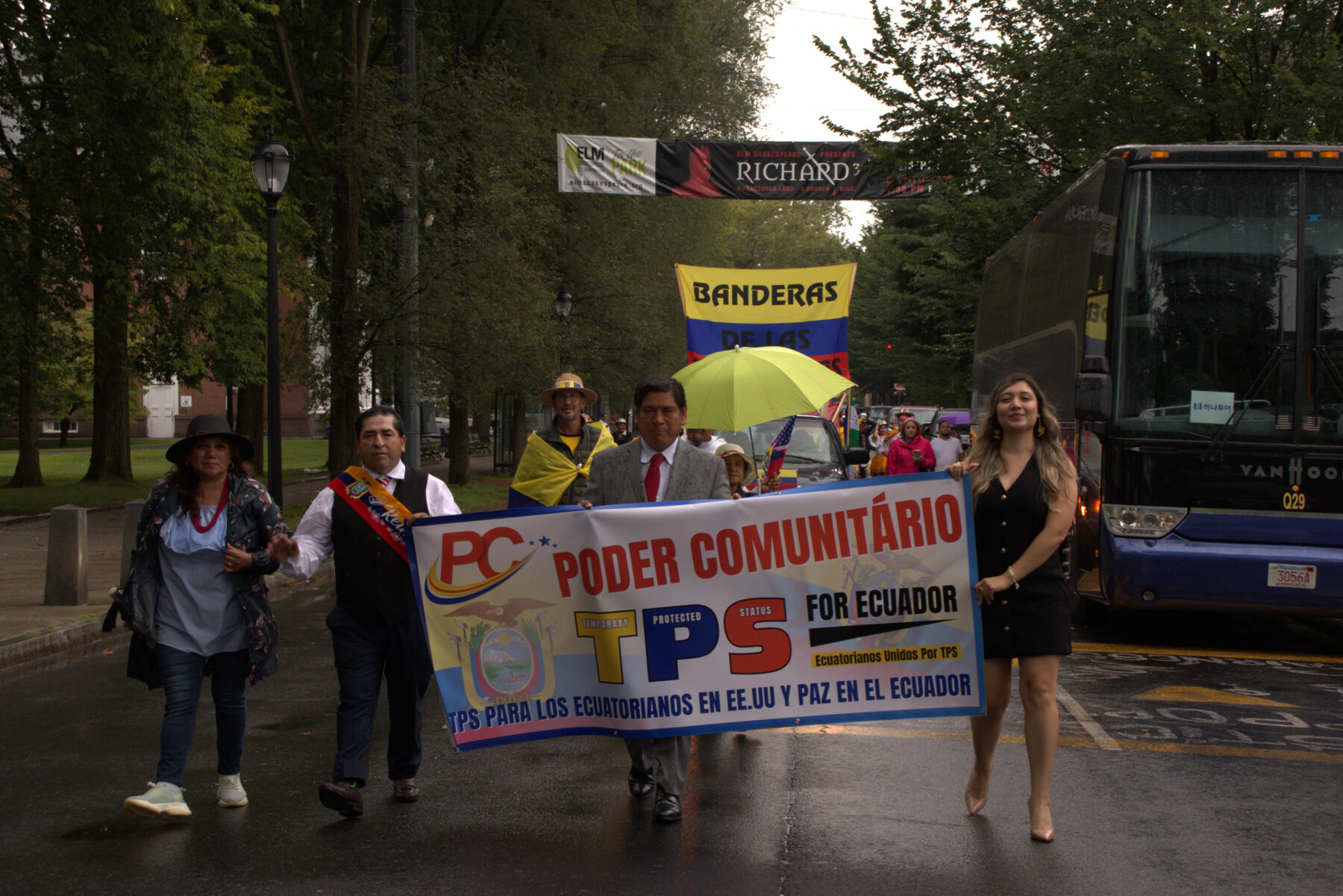
II.
From his office at 1 Church Street, Consul General of Ecuador Julio Prado Espinosa tells me that violence, especially extortion by criminal gangs, has come to surpass family reunification and poor employment conditions as the number one cause for resettling reported among the 70,000 patrons in the Consulate’s jurisdiction.
At a national level, the number of Ecuadorians attempting to enter the U.S. has surged dramatically in recent years. As of September 2024, 122,072 encounters with Ecuadorian nationals were reported by Customs and Border Protection (CBP) this year along the Southwest border, a 5.03 percent increase over 2023 and a 407.4 percent increase over 2022.
For most Ecuadorian migrants coming to the U.S., the only possible route runs through the dense rainforests of Central America before reaching the U.S.–Mexico border. Prior to 2021, when Mexico started requiring tourist visas for Ecuadorians, people could fly to Mexico before continuing their journey north. Today, even if migrants manage to cross the perilous Darién Gap and reach Mexico by land, life-threatening challenges await once they arrive: kidnappings by drug cartels, unreliable coyotes, the absence of an Ecuadorian embassy to fall back on if things go wrong, and, at the end of the road, a heavily patrolled border where both Mexican and American agents stand ready to detain those attempting to cross.
Still, thousands of Ecuadorians arrive on U.S. soil every month, their incentives to reach a safe haven stronger than the military-grade equipment used to keep them out.
III.
Priscila arrived in Connecticut in 2022. Priscila, who is identified by her first name due to ongoing immigration proceedings, is 36 years old, a mother of two girls, ages 8 and 11, and lives in Old Saybrook, CT—just half an hour from the Consulate in downtown New Haven. Between twelve-hour shifts at work, afternoon community college classes, and the morning rush to get her daughters ready for school, she can barely spare the time to grant me an interview. When we finally manage to align our schedules, it’s Friday night, her one day off. “You know how it is on days off,” she says, “there’s just more work to do… helping out my sister, the girls—it never stops.”
Priscila calls her current line—or lines—of work “extemporáneos.” For now, she has a relatively stable job, taking care of an “elderly American lady,” una ancianita americana. She likes it. It keeps her busy Saturday through Thursday. Over the past two years she has also had to take on work doing nails and cutting hair, learning through YouTube videos and similar self-taught methods. “I’m bad with my hands, really,” she tells me. “I never thought I’d be doing things like these for work.”
Back home, in Ecuador, Priscila was a lawyer and a business owner. She lived in the Andean city of Cuenca where she and her husband started a car dealership back in 2011. She used to manage the legal department. She tells me a story of hard-earned social mobility: resettling from her rural hometown to a large city, getting married, starting a family, opening a business. Eventually, the couple’s efforts afforded them “stability, both economic and social.” They had children. They traveled, both in Ecuador and abroad. They settled comfortably into the ranks of an entrepreneurial middle class. “We were doing well,” she reminisces with a distant stare. “It was the fruit of our labor.”
That was all until their lives were threatened at gunpoint one day. Then, like many others, they were forced to leave.
IV.
Historically, Ecuador has been a peaceful nation. Even though the country is tucked between Colombia and Peru—two cocaine-producing powerhouses that have long contended with violent guerilla forces and militant groups tied to the drug trade—for most of this century, Ecuador ranked among its more developed neighbors like Chile or Argentina in violence indicators.
During the late 2000s and early 2010s, the nation experienced the largest oil boom in its history. Under the administration of then President Rafael Correa—who has since been convicted of bribery in the context of a multimillion-dollar corruption scheme—hundreds of public schools, clinics, roads, and houses were built all over the country. The poorest 40 percent of Ecuadorians saw their incomes grow eight times more than the national average. There was the promise of a welfare state on the horizon, the promise of a repatriation program for the tens of thousands of migrants who had left in the 1980s, the promise of a bright future and an everlasting source of export revenue buried under everyone’s feet to fuel it all.
That changed in 2016, when the FARC—a Colombian guerilla group that controlled 60 percent of the world’s most productive coca crops at the time—signed a peace deal with the Colombian government, effectively demobilizing a fifty-year insurgency and creating an enormous power vacuum in the cocaine trade. Foreign organized crime groups began flooding into Ecuador. Each sought a slice of the country’s newly competitive—and highly lucrative—drug transportation routes.
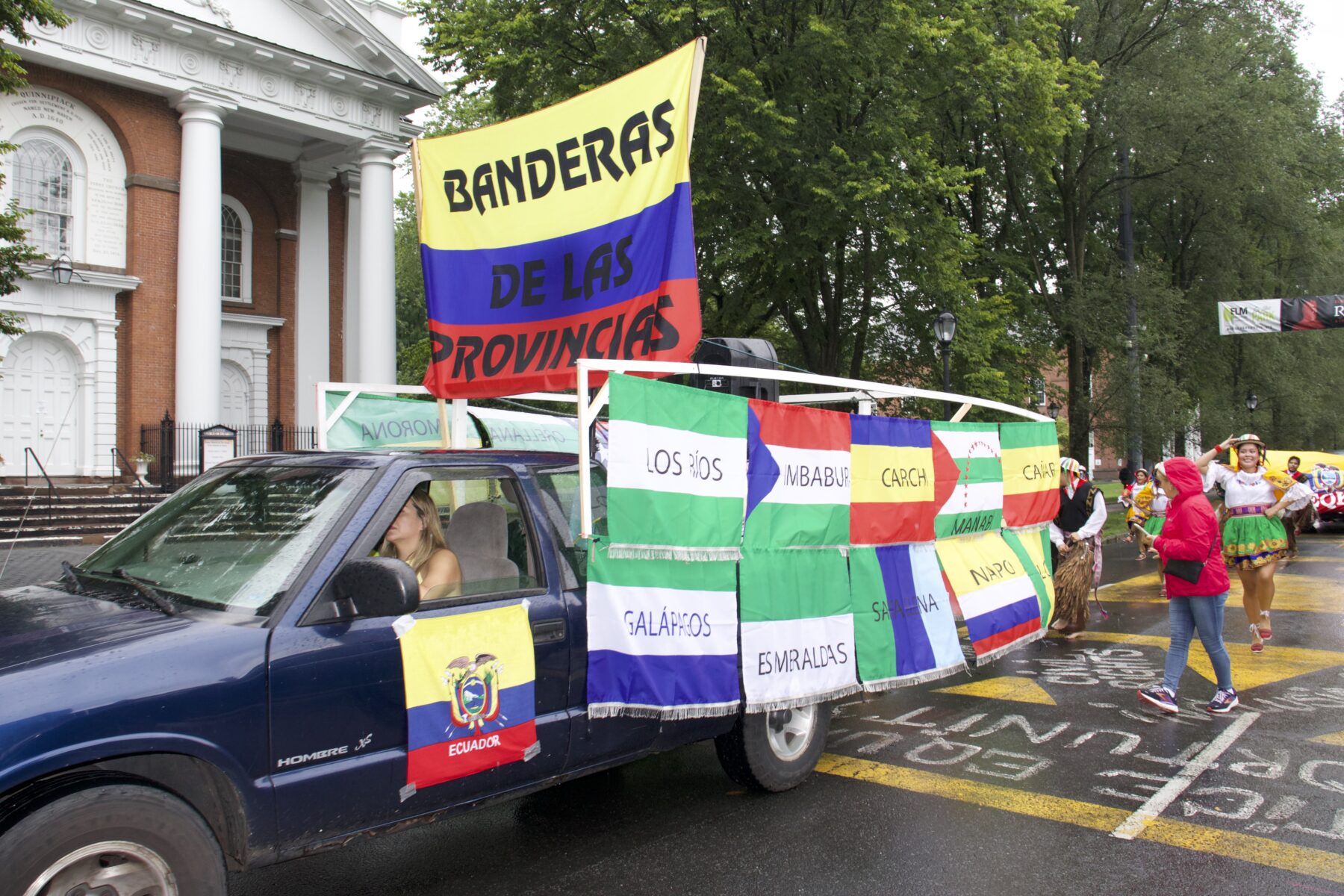
Collusion networks between organized crime groups and government officials which had formed under Correa and a fall in oil prices toward the end of the 2010s allowed criminal organizations like Los Choneros, Los Lobos, and Los Tiguerones to take hold for years to come.
In 2023, eleven days before citizens voted for a new president, candidate Fernando Villavicencio—a former journalist who repeatedly called for stronger measures against drug gangs—was shot and killed by a group of Colombian hitmen as he left a political rally in Quito. The Attorney General’s Office found evidence linking Villavicencio’s murder to the Lobos gang.
Years before they made national headlines, however, criminal organizations like Los Lobos were already spreading fear through the streets of the major cities.
V.
Priscila says it started in 2019, when a series of mysterious men began showing up at the car dealership asking to talk to her and her husband. Random cars started looking eerily familiar. Motorcycles constantly flashed in and out of her rearview mirror, trailing her like shadows on the road. She began to recognize the same young man in a helmet around town. “At the beginning, you’re in your own world. You drive your car and you feel fine. But you start realizing at some point that it’s the same bike, it’s the same guy everywhere and it’s no coincidence,” she said.
The men who showed up at the office wanted money. Five thousand dollars every month. They identified themselves as members of Los Choneros, a drug syndicate based in the coastal city of Guayaquil. In exchange for the monthly installments, they promised to invest in firearms, explosives, patrol cars—“defense equipment” to protect the neighborhood from rival gangs.
“I had neighbors who paid,” recalls Priscila. “They paid because they were afraid.” Priscila held out at first; five thousand dollars every month was not a sum her family could spare.
One day, she got a call about a car sale opportunity in a town in Guayas, not far from the border with her home province. Transactions like this were common; she often took trips around the country to buy and sell cars. On this occasion, Priscila and her husband decided to take their daughters with them for a family trip.
When the family arrived at the meeting location, they found no one there. After a tense twenty-minute wait, two armed men pulled over abruptly on a motorcycle. They began to harass Priscila’s husband with threats, insults, and their firearms. “When I saw that, I swear, I thought it was all going to end there, that our lives were going to end,” Priscila remembers. “I thought those people were going to shoot us on the spot.” She crouched inside the car and covered her daughters’ eyes.
The men told Priscila’s husband that if he didn’t pay them five thousand dollars every month, they were going to hurt his family. They said they were going to kill his daughters.
The Rivadeneiras tried every possible legal avenue to protect themselves. They filed a police report. They appealed to local prosecutors and other authorities for protection. But Ecuador’s weakened law enforcement system failed to stop the threats. Eventually, the family decided to leave the country. They had relatives in Connecticut. They came to the U.S. on tourist visas. They brought as many of their belongings as they managed. They left everything else behind.
VI.
“If they ask for your papers, and you don’t have them—you’re committing a crime. And you don’t want to commit a crime because you’re not a bad person, but you’re forced to do it out of necessity.”
Just an hour and twenty minutes away from Old Saybrook, where Priscila’s family would eventually settle, and mere days after the murder of Fernando Villavicencio in 2023, Angélica Idrovo got a call at her home in Danbury. It was Carlos Córdova, an immigration organizer she knew through the Danbury Ecuadorian Civic Center.
Angélica left Ecuador when she was twelve, and became involved with immigration advocacy groups in high school. Carlos had a background in unions and worker’s rights associations in Ecuador, which expanded to include immigration work once he resettled.
“Anghy,” she remembers Carlos saying over the phone, “we want to hold a meeting to talk about what Ecuador is going through. We want to talk about the killing…We’re going to pitch the idea of fighting for TPS.”
Angélica replied in an instant. “Perfect, count me in.”
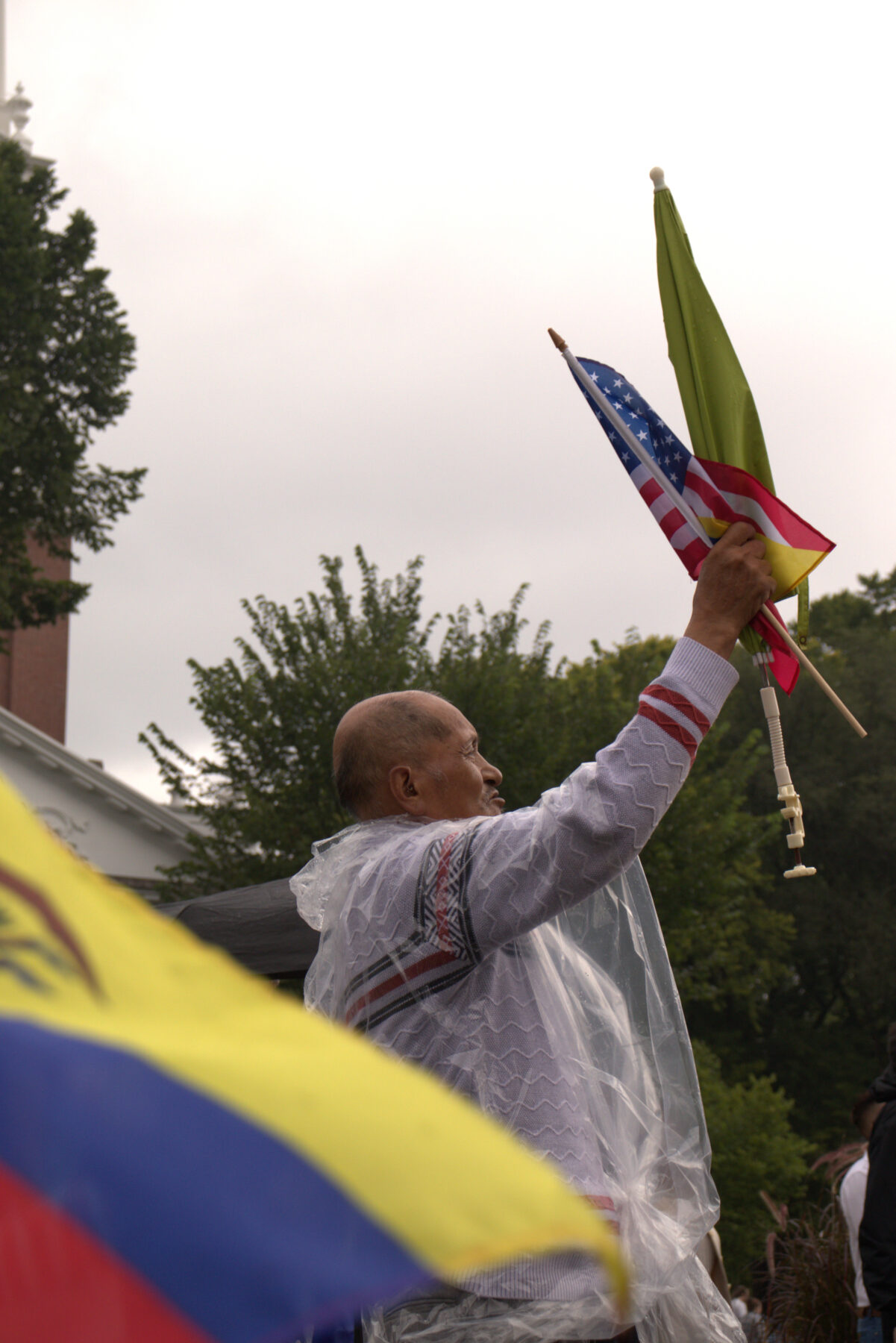
TPS confers three main benefits on qualifying individuals during its period of designation: 1) they are not removable from the United States; 2) they can obtain an employment authorization document (EAD); and 3) they may be granted travel authorization. For some 162,000 Ecuadorians who are undocumented in the U.S., these protections would be nothing short of life-changing.
When Priscila speaks to me about her family’s first few months in America, during which they had no official papers beyond their tourist visas, she is full of remembered anxiety. “I’m telling you, it’s like being on edge constantly, with the constant worry of when they might arrest you,” she says. “If they ask for your papers, and you don’t have them—you’re committing a crime. And you don’t want to commit a crime because you’re not a bad person, but you’re forced to do it out of necessity.”
Indeed, the lack of legal documents complicates every aspect of life in this country for people like Priscila. For one, it prevents them from seeking legal employment, forcing migrants to turn to informal and poorly regulated labor markets. Antonio Arízaga, a New York-based activist who presides over the United Front for Ecuadorian Immigrants, tells me that some undocumented Ecuadorians in this country work twelve, fourteen, even sixteen hours a day in restaurants, produce markets, and similar places, earning less-than-minimum wages. “Simply put, they are exploited,” he says.
A formal U.S. source of income also makes it easier to build a credit score and sign a lease. Lacking both when she first arrived, Priscila tells me no one would rent to her in Connecticut. The family had to relocate to Minnesota for several months to access a lease that accommodated their needs, and they weren’t able to return to Connecticut until after they had filed asylum claims.
Arízaga emphasizes the third benefit of TPS. It allows Ecuadorians to apply for a travel permit to return to Ecuador under special circumstances such as the illness or death of a family member, without fearing that they will not be able to re-enter the U.S.
Perhaps even more important than being let back into the country, however, is being safe from deportation in the first place. TPS protects beneficiaries against forced removal, a crucial provision for people with a high risk of being detained by Immigration and Customs Enforcement (ICE), such as immigrant day laborers, who must venture into busy public spaces each day to seek work.
Without TPS, Ecuadorian day workers in Connecticut have to withstand repeated crackdowns from ICE. One famous example is the 2006 case of the “Danbury 11,” a group of Ecuadorian men who were peacefully assembled at Kennedy Park in Danbury one morning before a van of undercover city police officers showed up and offered them work. The van took the men who accepted to a parking lot, where, as soon as they stepped off, ICE agents jumped out and arrested them. All of the men were subsequently placed into deportation proceedings based on statements they gave after being seized.
Yale Law School Professor Michael J. Wishnie ’87, LAW ’93 led a team of student volunteers in efforts to get the men released on bond. “Many immigrants with meritorious defenses forgo those defenses because it is too costly to pursue them,” he tells me. Wishnie and his students argued that the arrests had violated their clients’ rights under the Fourth Amendment.
After five years and countless legal maneuvers, the YLS team eventually won six hundred thousand dollars from the City of Danbury and the Federal Government for eight of the men. It was the largest settlement in the history of civil-rights actions brought by day laborers. ICE agreed to grant the men deferred action status. And yet, two of the original eleven men were still deported.
Today, TPS could change legal outcomes for the tens of thousands of Ecuadorian immigrants at risk of deportation who don’t have access to the resources and goodwill of America’s top law schools.
VII.
Angélica and Carlos held their first meeting in Danbury in August 2023, eight days after Villavicencio’s murder. About a dozen people, mainly leaders from local advocacy groups and cultural centers, convened to discuss the implications of the violence in Ecuador for immigrants in the U.S. It was clear to them that under those conditions, it wasn’t safe for people like Priscila to go back.
A few weeks later, a second meeting was called. Then a third, this time in Stamford. About sixty people showed up. A fourth meeting in Danbury. Then Meriden. Then New Haven. Leaders from these and other cities like Bridgeport, Stamford, and Norwalk decided to form a steering committee, with Angélica and Carlos at the head. Engagement was increasing slowly but steadily.
Then, in January of this year, the movement suddenly gained explosive traction—there had been new developments back home.
In the first weeks of 2024, a terrifying wave of riots broke out in Ecuador, first inside most major prisons and then across the country. Gangs kidnapped police officers, detonated explosives in the streets, and set cars on fire as devices of intimidation. In Guayaquil, a group of hooded men stormed a news studio during a national broadcast and pointed firearms at the heads of journalists. Eleven people died in just a few days. More than 850 were arrested.
In an exceptional exercise of executive power, President Daniel Noboa declared a state of “internal armed conflict” and unleashed the military upon the country’s gangs in an attempt to calm the ongoing riots. Back in the U.S., this created a surge of interest in the TPS movement that had been taking shape in Connecticut. “It was in that instant that Ecuador met the conditions for designation,” Arízaga told me.
Under the Immigration Act of 1990, the Secretary of Homeland Security has the discretion to grant TPS to countries under three scenarios: an ongoing armed conflict (such as civil war); an environmental disaster (such as an earthquake, hurricane, or epidemic); and what is simply described as “extraordinary and temporary conditions.”
Prior to the January riots, Angélica’s team had devised a policy strategy to prove that the violence in Ecuador amounted to “extraordinary conditions,” a hard claim to prove due to the vagueness of the legal language. But Noboa’s declaration of an internal conflict prompted them to realign their plan.
“The hope now,” Angélica tells me, “is that Ecuador will qualify for TPS under the condition of ‘ongoing armed conflict,’ which is far more concrete.”
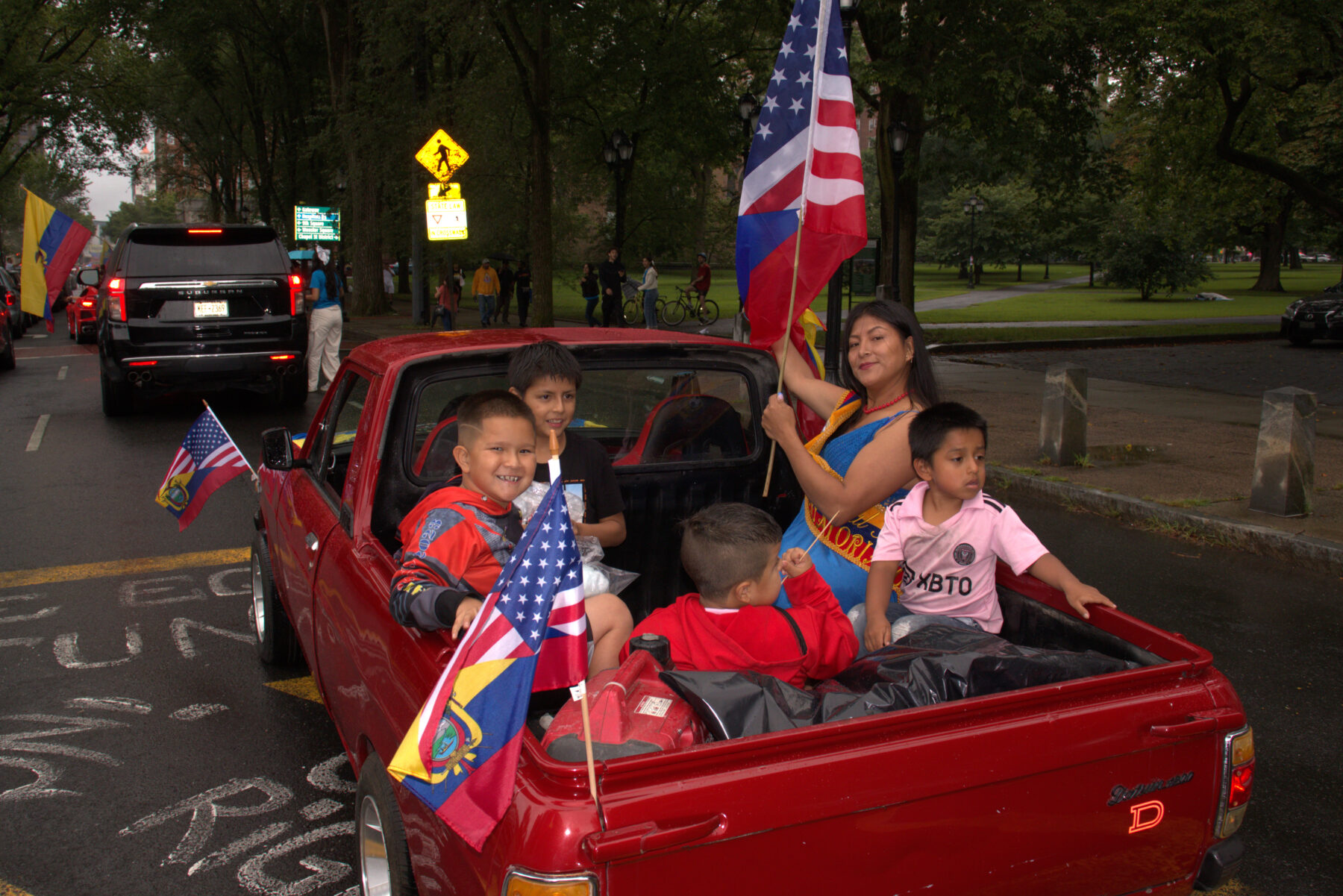
VIII.
In 2024, Angélica and Carlos’ Connecticut-born movement began to gather national momentum, converging with more recent, independent campaigns nationwide. Angélica says she connected with activists from New York, Minnesota, Utah, and California, all assembling their local communities to talk about the same goal: securing TPS for Ecuadorians.
In January, advocacy groups in New York, Pennsylvania, and Connecticut delivered letters to Ecuadorian officials across East Coast consulates, asking their government to endorse the petition for TPS with Washington. On January 23, Ecuador officially requested TPS for its migrants through a formal petition to the Department of Homeland Security (DHS). However, every activist I talked to stressed that the Ecuadorian government’s support has been far from vigorous. President Daniel Noboa has come to the U.S. on several official visits since he took office in January, and not once did he speak about TPS.
On February 22, 2024, New York organizers secured a meeting with three members of Congress, including Rep. Alexandria Ocasio-Cortez, to request their support in advocating for TPS with officials in the DHS. Exactly a month later, Ocasio-Cortez led twenty-four members of Congress in sending a letter to Secretary of Homeland Security Alejandro Mayorkas and Secretary of State Antony Blinken emphasizing the urgency of TPS as a measure for keeping Ecuadorian immigrants in the U.S. safe from the violence facing their home country.
The same week, leaders from major East Coast cities formed a National Coalition of Ecuadorians for TPS, inviting every state with a TPS advocacy movement to join forces. In June, the coalition organized a march to D.C., with people coming from as far as Florida and Utah to voice their support for the cause.
Less than a week after the march, the coalition’s leaders were called to a meeting with officials from the White House and Departments of State and Homeland Security. At the meeting, Angélica said Homeland Security representatives told her and the other leaders that a joint committee was working on a report to assess whether Ecuador qualified for TPS. As of early November, the coalition hasn’t heard back from the department.
Despite the delayed response, activists still hold out hope for a favorable policy outcome—even in the face of Trump’s victory in the presidential election earlier this month. They expect the Biden administration will act swiftly in the coming months to safeguard protections for vulnerable communities before Republicans regain control of the executive branch in January.
With Trump promising mass deportations for his second term, approving TPS before he takes office would provide a buffer for Ecuadorians at risk of being sent back to a country ravaged by organized gang violence. For people like Priscila, this protection could mean the difference between life and death. What’s more, it could endure well beyond Trump’s inauguration, even if he tries to repeal it.
Trump has tried and failed to rescind TPS designations for several countries in the past: first for Nicaragua in 2017 and then for El Salvador in 2018. His attempts were challenged in federal court, leading to a 2018 injunction that temporarily blocked the terminations—and bought Nicaraguans and Salvadorians years of TPS protection, even as the administration sought to phase it out.
Activists hope for that sort of protection against Trump’s mass deportation policies for Ecuadorians, too. The coalition’s plan is to continue pressuring Mayorkas throughout the year.
IX.
Many will face deportation to a country overwhelmed by violence before Trump’s inauguration in January, and, if Mayorkas doesn’t heed the community’s calls, many more after that.
Carlos and Angélica talk to me about how proud they are of the concrete victories their campaign has already achieved: lawmakers they met with, letters to high-ranking officials, protesters in high numbers assembled outside of Congress. They have had to fight for every inch of ground they’ve gained in public life. They’ve known what it’s like to be undocumented.
To be undocumented is to be denied the same political representation as everyone else in the country where one lives and works, while still being subjected to the same laws. To be undocumented is to be denied the right to vote. To be undocumented is to be dispossessed of the most essential tools for political agency. And yet, undocumented people still find ways to call upon those in power.
“Someone has to speak out for us—not in the name of a political party, not in the name of any candidate, but in the name of the community, that community that’s out there on the ground, that wakes up early to work in the fields, in the restaurants,” Carlos says. “It should be us who put forward this proposal.”
Angélica knows how much time it takes for independent activism to take shape. “I’ve been at this for a while,” she says. “It doesn’t happen in a day.” For now, she reflects on the work ahead. “Something that helps me a lot,” she tells me as our conversation draws to a close, “is reminding myself that hope, at the end of the day, is a discipline.”
It may yet take more hope, and discipline, before Ecuadorians are granted the protections of TPS. Many will face deportation to a country overwhelmed by violence before Trump’s inauguration in January, and, if Mayorkas doesn’t heed the community’s calls, many more after that.
Still, though the policy outcome remains uncertain, the significance of the underlying activism should not be overlooked. Through the TPS campaign, this community has built an advocacy network that stretches across the country. It has shown that even though hundreds of thousands of Ecuadorians in this country may lack legal papers, they are not for that without political agency. In that respect, the consequences of this movement for Ecuadorian organizing will far outlive a second Trump term.
–Matías Guevara Ruales is a junior in Jonathan Edwards College and an Associate Editor of The New Journal.
Photos courtesy of Matías Guevara Ruales.


